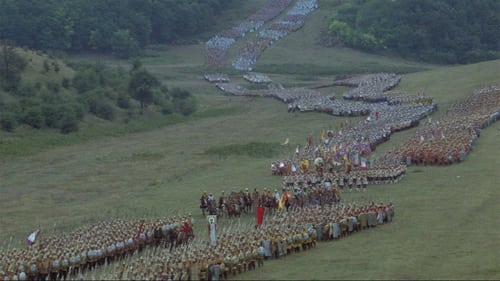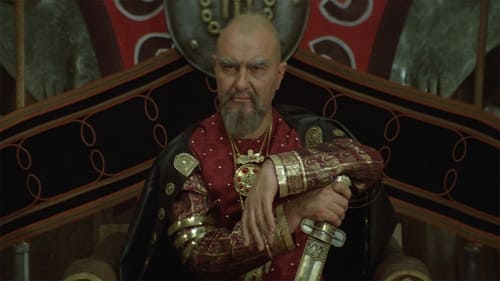Antony Genov
Nacimiento : 1950-02-09, Sofia, Bulgaria
Muerte : 2006-12-15
Historia
Antony Angelov Genov is a Bulgarian theater and cinema actor. He was born in Sofia, Bulgaria on February 9, 1950. He graduated from National Academy for Theatre and Film Art, Sofia, Bulgaria in 1974 with a degree in "acting" in the class of Professor Nadezhda Seykova. He played on the stages of Theatre "Tears and Laughter" (1974) and the National Theatre "Ivan Vazov" (1978-1979). He has duplicated films and series in his career. He has taken part in radio plays, television recitals and concerts. He was a member of Union of Bulgarian Filmmakers. Until his death he was married to actress Nelly Monedzhikova with whom he has one son - Angel Genov, who is also an actor. Antony Genov died on December 15, 2006 in Sofia, Bulgaria.

A story about the Macedonian rebellion of 1901.

Vladimir-Rasate
Knyaz Boris I reached the most important spiritual insight - the country needed a single language and script. It accepts students of Cyril and Methodius, creating Ohrid and Preslav Literary School. What other nations took centuries, for bulgarians takes place only about 20 years after their baptizing - introduced a Slavonic Alphabet.

Vladimir-Rasate
The picture features the life and deeds of Boris I - strong historic personality, which completes his mission to the full and at the end of his life receives holy orders. Prince Boris I is ruling in the late 9th century. In his youth, he, the brilliant statesman and diplomat, is experiencing heavy defeats in the wars he wages against his neighbors. Nonetheless, he manages not to cede any territories to the enemies. Under his rule, Bulgaria breaks with paganism and joins the Christian community, paying an exorbitant price, a heavy death toll, but there is no other way. The adoption of Christianity in 864 was a historical event of great significance. It guaranteed Boris I much need peace with the Eastern Roman Empire and allowed him to merge the numerous tribes inhabiting the country into a unified nationality and later to found a state. Boris I introduced the Slav script, thus turning Bulgaria into the cradle of Slav culture.

Velizariy
The last part of the epic "Khan Asparukh" - "Land Forever" is an impressive finish to scale narrative, created for the nationwide celebration of 13 century anniversary of the Bulgarian state. The authors collected in final chord all storylines, culminating in the political strengthening of the young Bulgarian state. In the center of the film epic again is the image of Khan Asparukh - a lofty romantic hero who embodies the virtues and energy of his people.

Velizariy
This is an epic screen presentation showing the creation, the consolidation and the power of First Bulgarian Kingdom and the first Bulgarian ruler Khan Asparuh. The second part of the great historical epic - "The Migration" - tells about the long journey to the land of the Bulgarians of today's Bulgaria. Here the young Khan Asparukh laid the foundations of the new state. The authors adhere to the established historical versions for this event. The film builds on the impressive mass scenes and the convincing served psychological characteristics of the main characters. The image of Asparoukh is a natural center of the story, in which many minor persons recreate the environment of the Khan. Romantic exalted, Asparukh is shown as capable leader of the people, consistently implement his own ideas.

Velizariy
This is an epic screen presentation showing the creation, the consolidation and the power of First Bulgarian Kingdom and the first Bulgarian ruler Khan Asparuh. This is the first part of the film trilogy about the events before the creation of the Bulgarian state in the middle of the VII century. Volga Bulgaria is straining under the attacks of the Khazars. Following the testament of his father, the sons of Khan Kubrat looking for a new home for their tribes. The youngest of them - Asparukh, wander 20 years in search of "land forever" for his people and reaches the mouth of the Danube. The film is narrated by captured Byzantine chronicler Belisarius, which should Asparukh in his journeys. Byzantine witnessed the heroic efforts of the Bulgarians to win the land south of the Danube and to create their new country.

Dr. Bankov
Where does the dividing line lie between insanity and supersensitive mentality? How should we treat people who act in a different way then we do? A young and gifted shrink sets up a group, using up-to-date and unknown methods. His idea is to socialize such people, to integrate them into a society they keep aloof from, and help them to survive.

Velisarius
In 651, Khan Kubrat died and the Khazars accelerated their raids upon Great Bulgaria. His five sons split the Bulgarian tribe and each led his to find new land where they could live in peace. Khan Asparukh, the youngest son, went west and, after an arduous journey lasting for years, southward across the River Danube, into Moesia. In 680-81, in alliance with the Slavs, he inflicted stunning defeats on the Roman legions and forced the Byzantine Empire to recognize the formation of the new state of Bulgaria in the lands where it still exists today.

Philip
Phillip is married to Rositza but has a kid from Marta. Rositza adopts the kid, but she could not keep neither it nor her husband. Phillip takes the kid and moves to the attic where Marta lives. Rositza comes to pick up the kid, since she wants to take care of it. In the quarrel for the kid, get involved the proprietor of the attic Venera and her nephew Svetlozar. Soon everyone starts to unravel his or her own live experiences. The kid does not make a noise in the other room just to show that everyone has forgotten about him. No one from the characters has seen his or her faults. In order for them to avoid their vulnerability, they have a behavior style, which is not part of their human nature. They have lost their essence.

Kalaydzhiev
This is a film about a traveling theatrical group in the beginning of 20th century. The itinerant troupe arrives in the little town, comprising several families, an eccentric student, an anarchist, all united by their love for theatre. The theatricals of 'Othello' are pending. All of a sudden, the performer of Desdemona falls ill. The local woman teacher plays in her stead. She makes a success and joins the troupe. The young woman travels with them along the dusty country roads and never gives up. Step by step she becomes a very good actress and assumes the leading of the group through its complex life. United by their common fate, the actors go through the joys and disappointments of their pioneering educative mission together.

Volov
The film is based on Zahari Stoyanov's memoir "Notes On Bulgarian Uprisings" depicting the events around the April Uprising in 1876.





